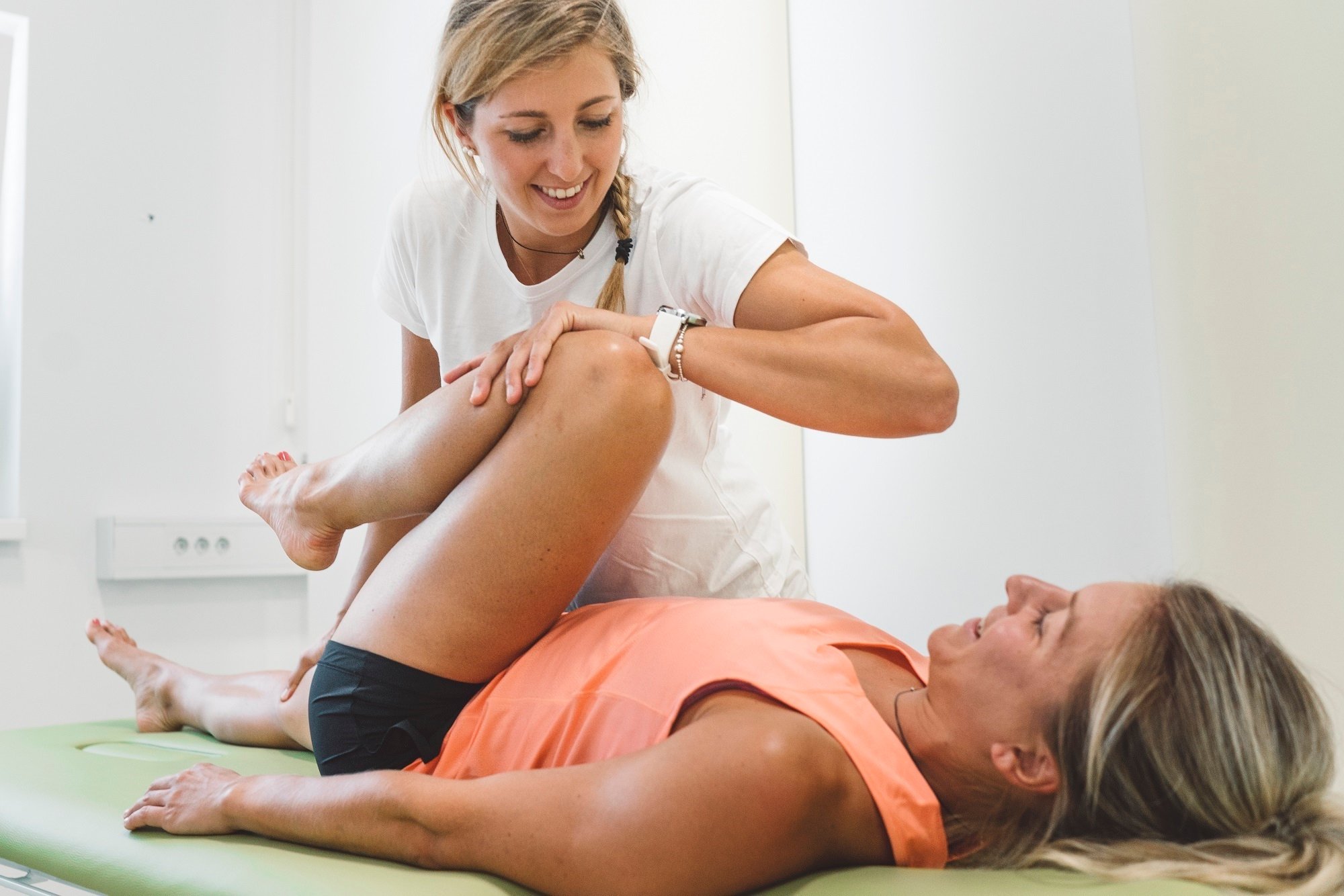How are we looking after our joints in the UK?
Over the past month, there have been almost 3 million UK searches for ‘back pain’, ‘knee pain’ and ‘hip pain’*.
Whether caused by injury, age, lifestyle factors, or underlying health conditions, joint discomfort is a common yet often overlooked health issue. Over the past five years, interest in ‘knee pain young’ has doubled in the UK*, showing that younger generations are also experiencing joint-related problems.
To better understand how joint pain is affecting the population, health insurance provider AXA Health has commissioned a survey of 2,000 UK adults aged 18+ to uncover how joint pain is affecting the population. The report explores the prevalence of joint pain among different demographics and how individuals prioritise joint-related symptoms compared to other health concerns.
Our latest research findings
- Over 1 in 10 (12%) of the UK population is suffering from a joint-related issue
- Women (15%) suffer from arthritis almost twice as much as men (8%)
- Gen X (7%) are experiencing sciatica more than any other generation
- 1 in 3 of the UK don’t do any casual stretching on an average day
- Almost 3 in 10 (29%) experience stiffness in their knees in the morning or after periods of inactivity
- 18% of the population don’t do any casual stretching, and only 19% stretch regularly
- 8 in 10 (82%) use a computer or laptop every day, but only 1 in 10 (11%) use a supportive chair when working at a desk
- Only 1 in 4 (25%) would visit the GP if they had severe neck pain
- 13% aren’t sure what they’d do if they experienced persistent joint pain
Over 8.5 million people in the UK may be suffering from a joint-related issue
Over 1 in 10 (12%) of the UK population presently suffering from a joint-related issue.
These are the leading joint-related issues in the UK
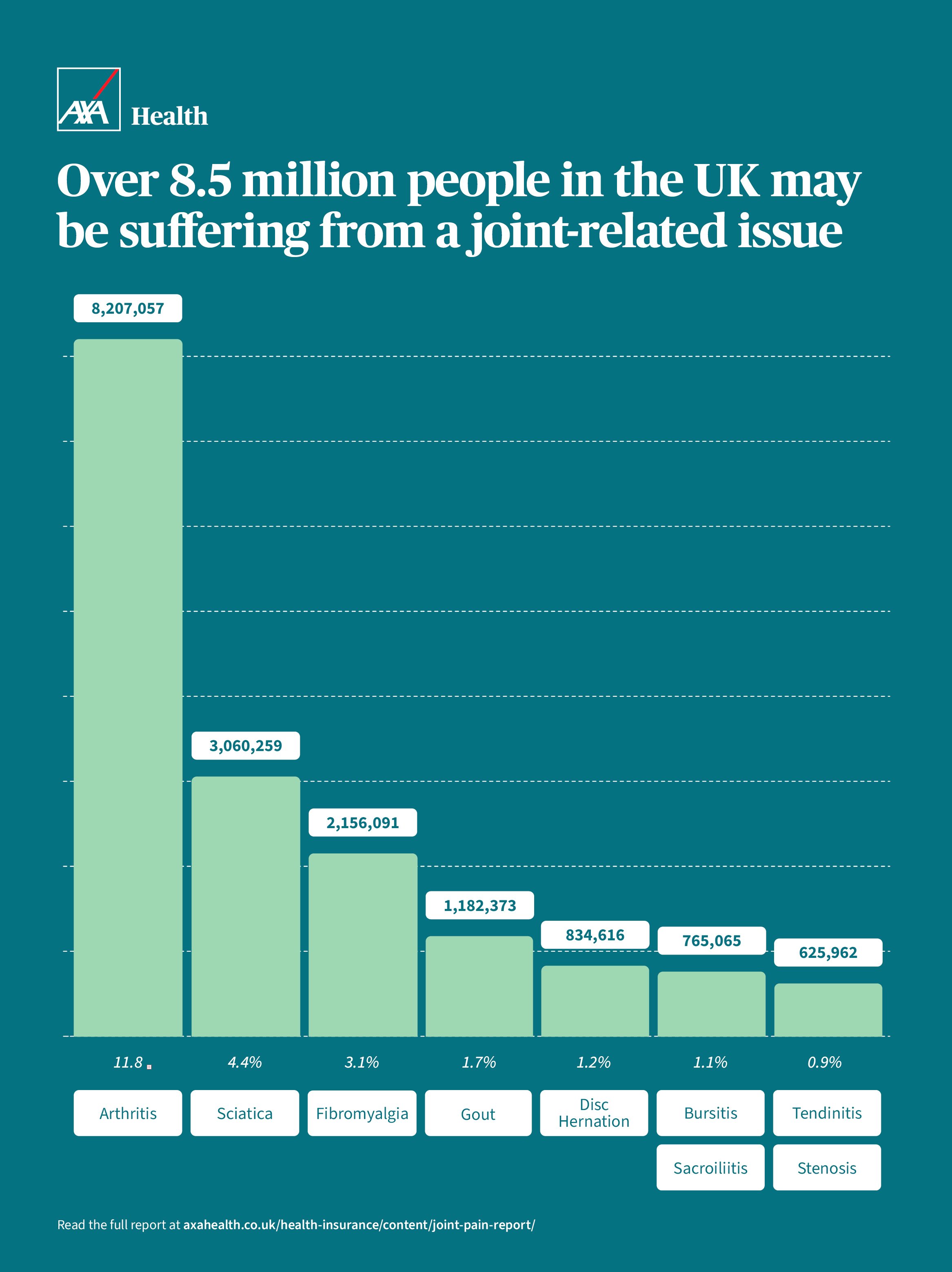

* Based on the total population of 69,551,332
More women are suffering from arthritis than men
Our survey data found that 12% of the UK population may currently be suffering from arthritis, a condition that causes inflammation and pain surrounding the joints.
However, almost double the number of women are suffering than men, with more than 1 in 5 (22%) women saying arthritis runs in their family.
Over 3 million people may be suffering from sciatica in the UK
Our results found that Gen X (7%) is suffering the most, compared to 5% of baby boomers and only 2% of the silent generation.
2.1 million people in the UK may be suffering from Fibromyalgia
The highest rates in Northern Ireland (9%). Like arthritis, the condition is more prevalent among women, particularly those aged between 30 and 60.
74% don’t exercise regularly
When asked about their lifestyle, only 24% of respondents said they exercise regularly (3+ days a week), with just 1 in 3 (33%) brisk walking for longer than 30 minutes per day. Also, the data revealed that competitive sports are the least favoured exercise activity across the nation, with 43% never participating.
Interestingly, 4 in 10 UK residents avoid doing any form of high-intensity workout, in addition to around 1 in 3 (32%) never doing low-intensity workouts."
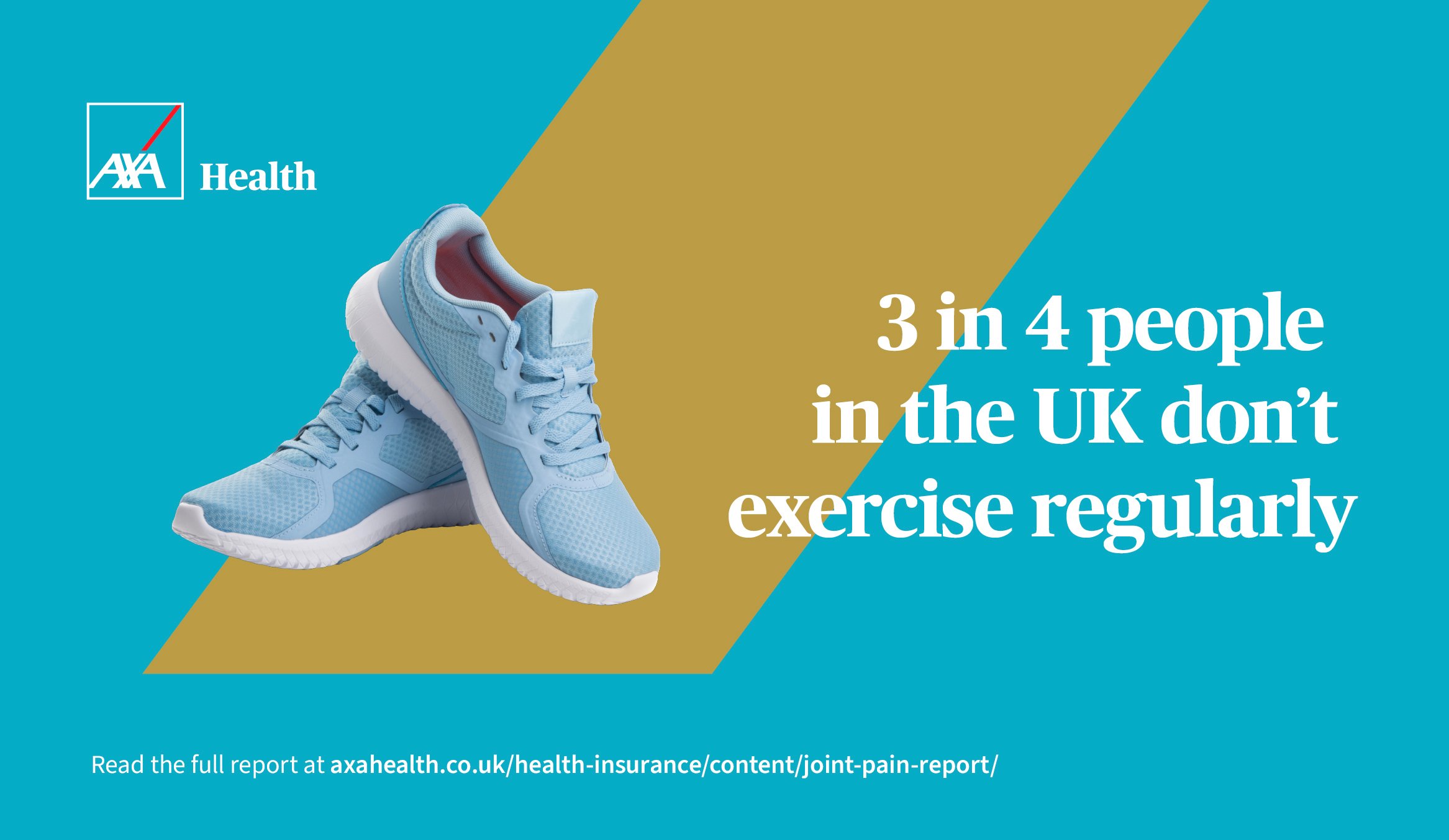

Over 1 in 10 baby boomers aren’t getting their daily steps in
On average, the nation spends 2 hours 56 minutes a day walking, including commuting on foot. However, the survey found that almost 1 in 4 (24%) of baby boomers (those aged 60-78) don’t partake in brisk walking. Whilst 40% of the UK proceed to commute to work via driving and public transport, a 60% majority walk.
1 in 3 don’t do any casual stretching on an average day
1 in 3 (33%) people admit to not doing any casual stretching (classed as any stretching outside of yoga/pilates) at all in the UK.
Of the baby boomer generation, almost 1 in 4 (24%) don't stretch, and 20% currently suffer from stiffness in their hips during periods of inactivity.
The UK spends over triple the amount of time using technology than walking
Although the nation spends 2 hours 56 minutes a day walking on average, over triple the amount of time (9 hours and 25 minutes) is spent using technology daily, including watching TV, using mobile phones and laptops, and playing on gaming consoles.
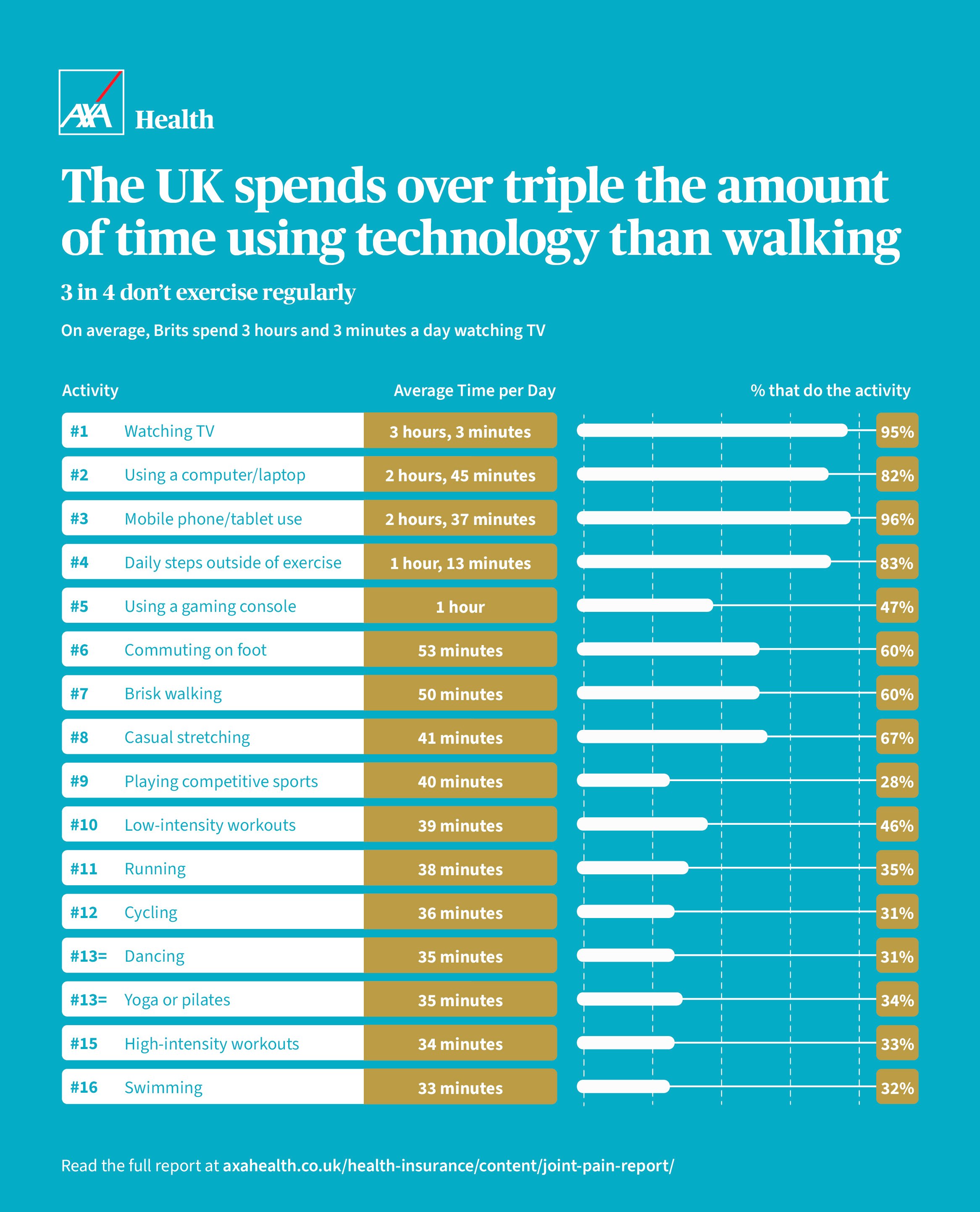

The UK are spending 3+ hours at desks at work
90% of the nation is spending time at a desk every day. This number is particularly high for 18-24-year-olds, with 96% doing desk work without a supportive chair.
The average time spent at a desk in the UK daily is 3 hours and 6 minutes a day, and over 8 in 10 in the UK spend this time working on a computer or laptop.
Millennials and Gen Z are experiencing the most pain from technology use
Our findings show that 8% of the nation experience joint pain when gaming or using technology, with 11% experiencing tingling or numbness in their fingers and 10% experiencing stiffness in their fingers. 80% of Gen Z use a gaming console every day - the most out of any generation.
Almost 1 in 3 experience knee stiffness in the morning or after inactivity
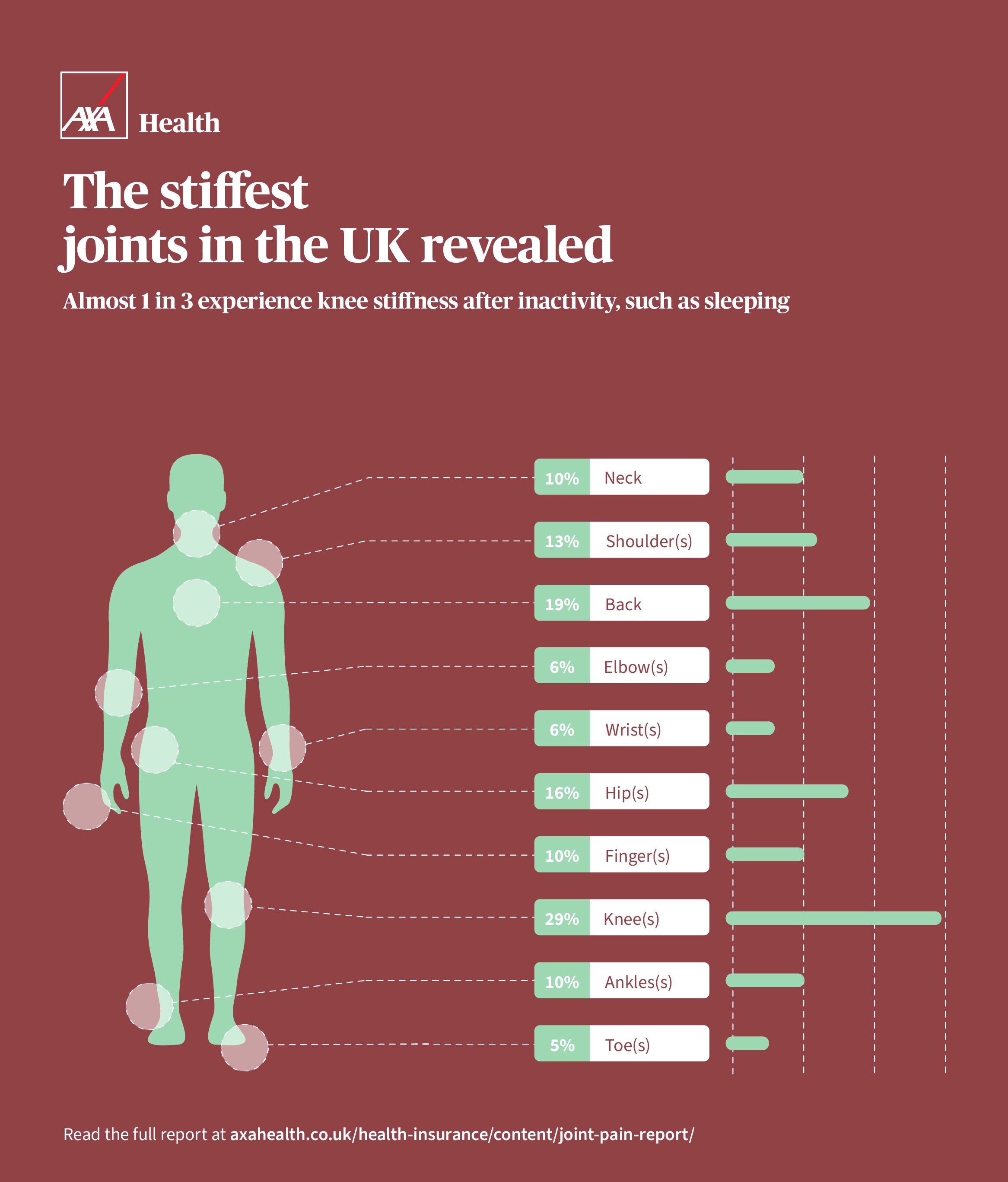

Knees seem to be the stiffest joints in the UK
For the health statement ‘my joint feels stiff in the morning or after long periods of inactivity’, respondents reported the most stiffness in the knees, almost 1 in 3 (29%). Knee pain can compromise daily activities, with 15% reporting that it affects their walking.
Over 1 in 10 (12%) also struggle to fully bend or straighten their knee. 1 in 5 (19%) of the nation do not stretch regularly.
Around 1 in 5 experience symptoms of back stiffness
The survey revealed the second stiffest joint in the UK is the back. Almost a fifth of Brits (19%) reported that their back feels stiff in the morning or after inactivity, along with over 1 in 10 (14%) said that pain in their back is persistent or keeps coming back.
16% of the nation experiences stiffness in their hips
Our results found that 16% of adults in the UK are experiencing stiffness in their hips, and it is the most common amongst baby boomers (21%) and women aged 18+ (19%). 6 in 10 women say they don't do any low-intensity workouts, along with 3 in 4 baby boomers.
Which job sector workers are most exposed to joint pain?
Retail, hospitality and service industry workers carry out the most heavy lifting
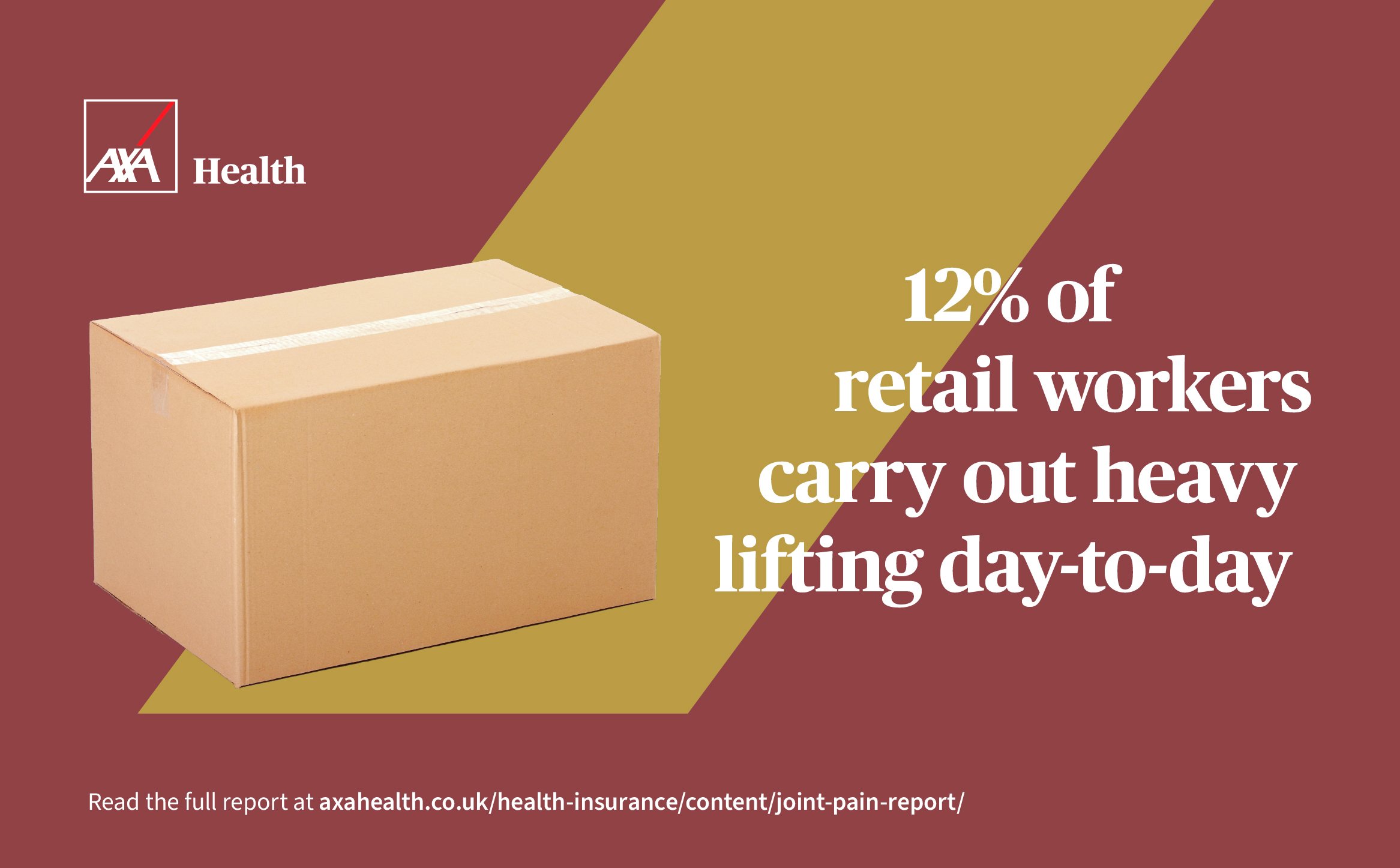

Our findings revealed that those who work in retail, hospitality and service industries are the most exposed to injury risks in the workplace, with 12% reporting daily heavy lifting.
Health and social care employees are most exposed to neck pain
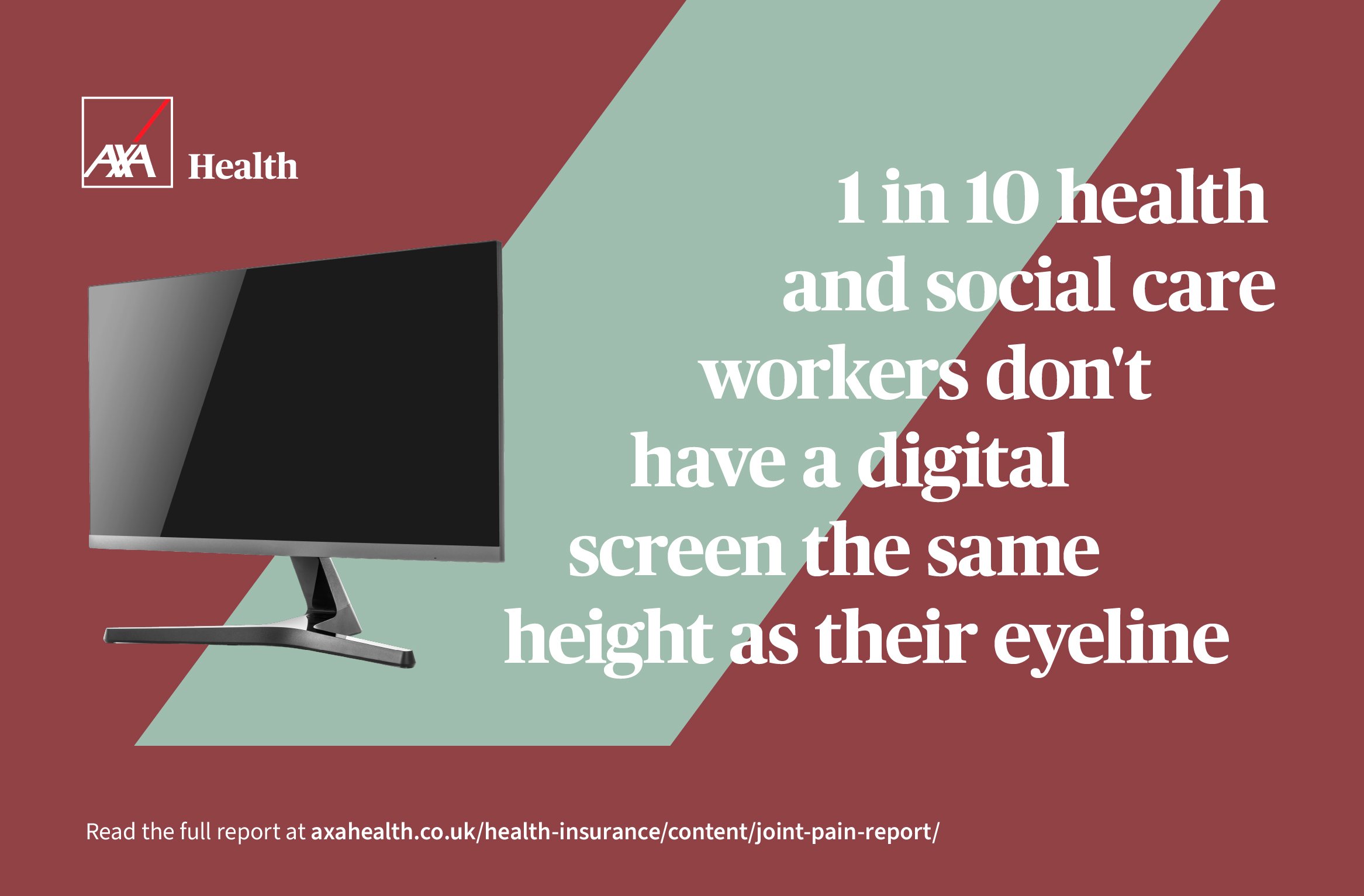

Almost 1 in 10 (9%) of adult workers in the health and social care sector reported not having their computer screens at the same height as eye level. 11% are also currently suffering from a joint issue or problem.
Less than 1 in 5 office and administrative workers use a supportive office chair
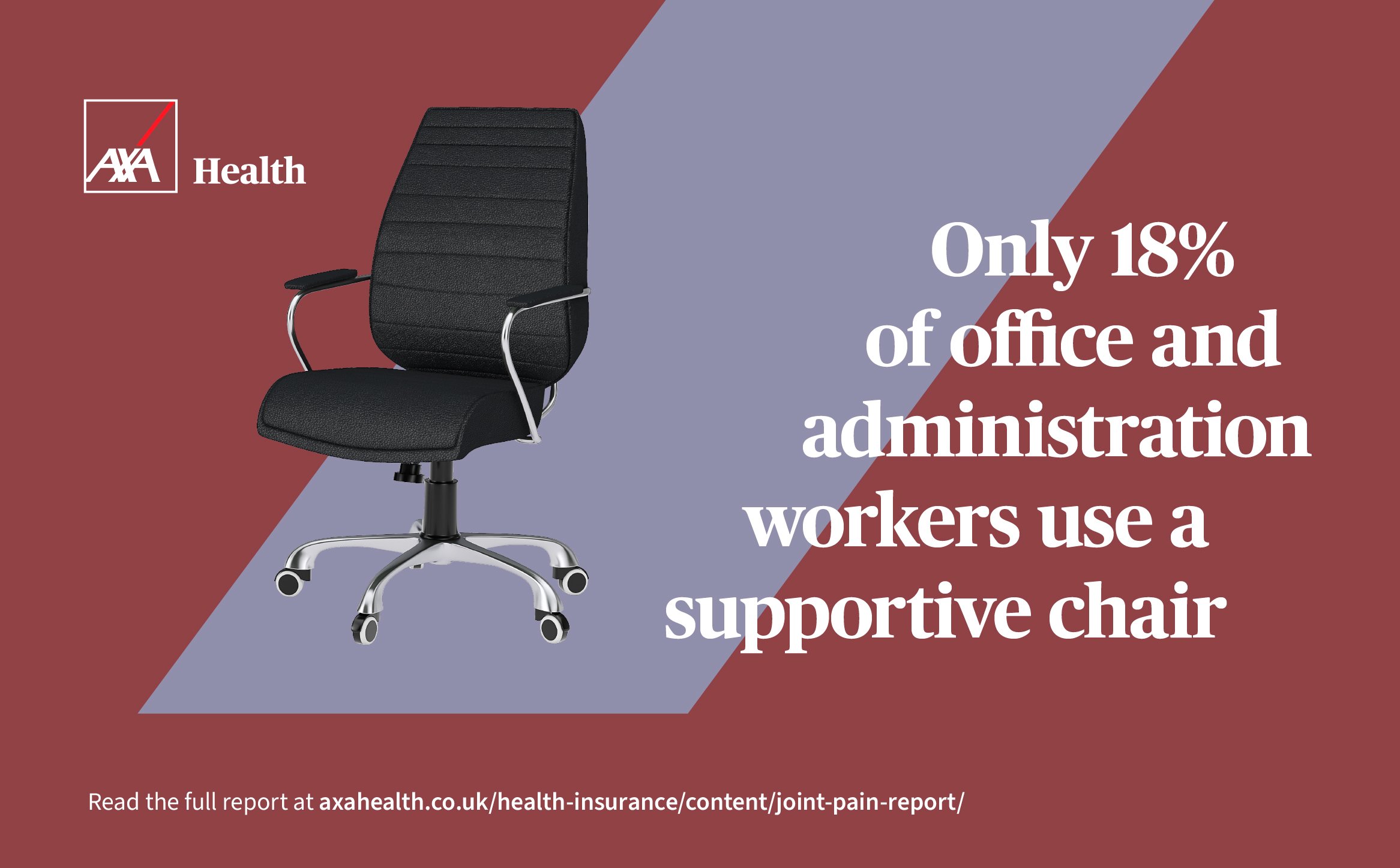

Only 18% of UK adults who work in office and admin roles are using a supportive chair while working, and 56% are sitting at a desk for more than 5 hours a day.
Which UK regions are least likely to visit the GP if they had persistent joint pain?
Only 1 in 3 (33%) of UK adults would visit the GP if they had persistent joint pain, with some regions being much less likely to seek help for the issue.
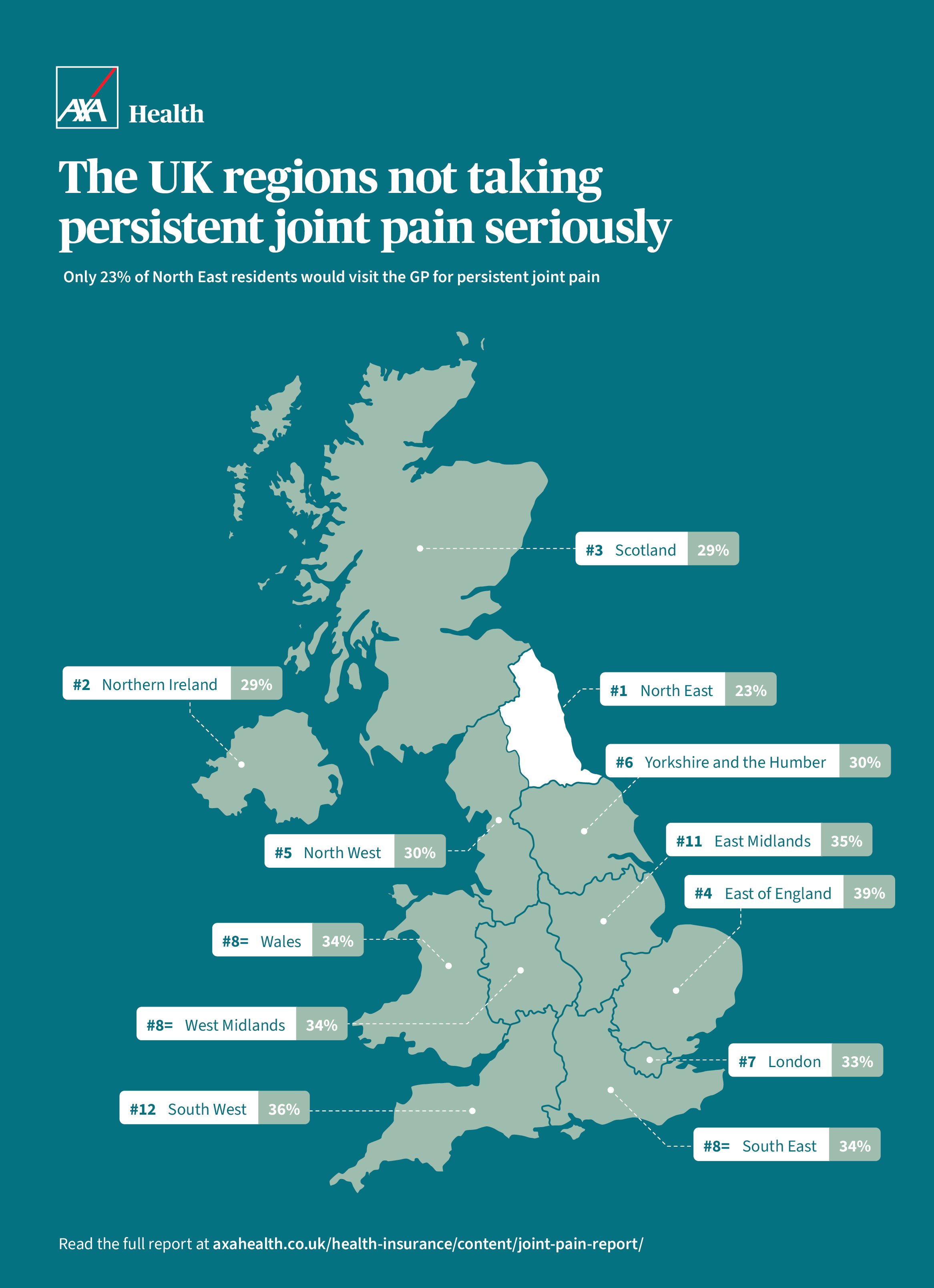

Less than 1 in 4 of North East residents would visit the GP
In the North East, including areas such as Northumberland, Tyne and Wear, and County Durham, only 23% said they would visit the GP for joint pain, the least of any UK county. A further 6% said they would simply ignore the pain.
Only a third of Scottish and Northern Irish would visit a GP for joint pain
Almost 1 in 3 (29%) Scottish and Northern Irish adults report that they would visit the GP if suffering from a joint condition.
Residents in the East of England are most likely to visit the GP for joint pain
In the East of England, almost 4 in 10 (39%) would go to the doctor for a joint pain issue, the most likely region in the country. 88% also would not carry on as normal if they were suffering from joint pain.
Here’s what people WOULDN’T do if they experienced persistent joint pain
When asked ‘What would you do if you experienced persistent joint pain?’, 13% of respondents answered ‘I’m not sure’, and 1 in 10 said they would carry on as normal.
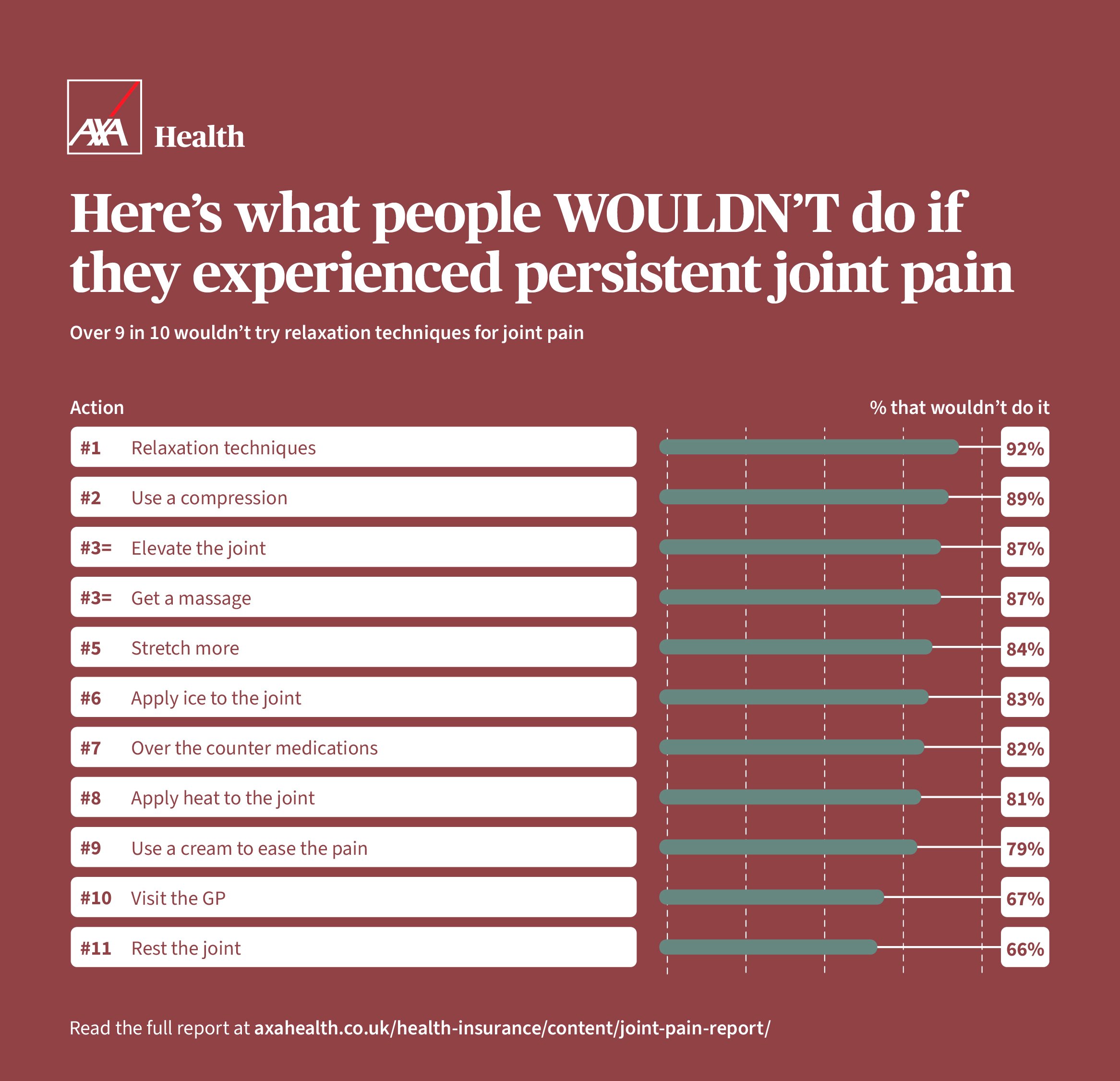

- The survey found that 89% of adults would not use compression when they are suffering from joint pain.
- Over 2 in 3 (33%) respondents said they would avoid a visit to the GP if they were experiencing persistent joint pain.
Methodology
AXA Health surveyed 2,000 nationally representative UK individuals aged 18+ in April 2025. Survey questions included whether respondents were experiencing joint pain, suffering from any pain-inducing conditions, as well as patterns in how and when individuals seek medical support. Respondents were also asked about their daily routines, such as desk work and lifestyle choices like exercise frequency. These insights were used to build an understanding of the lifestyle factors potentially influencing joint pain and joint health-related issues.
Sources
- Search Volume - io
- UK Population 2025 - Worldometers - 69,551,332
